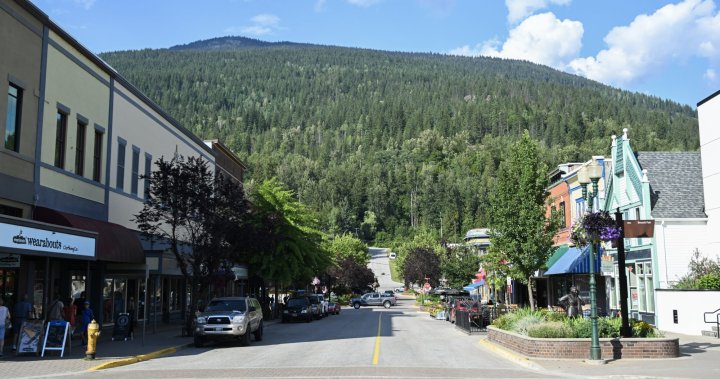This is the fifth instalment of New Roots, a series from Global News that will look at how evolving migration patterns and affordability challenges have changed life in communities across Canada since the COVID-19 pandemic.
Michelle Schiewe is in the process of leaving her dream community.
For the past 12 years, the 48-year-old day trader and single mom has lived in Revelstoke, a small city with a population of 8,200 in British Columbia’s southeast.
Nestled in the Kootenay Rockies, it has long been a destination for outdoor adventurers, particularly when the nearby ski resort opened in 2007.
Life was “easy, adventurous and fun” when Schiewe and her family moved to the city from Edmonton in 2011, she told Global News. When she got divorced three years later, finding a new home to rent was relatively easy.
By 2019, however, when Schiewe was forced to move again, she says short-term vacation rentals had taken over the available housing stock, and securing an affordable place to live was “next to impossible.” A lucky break prevented her from being forced to move into a motel.
Now, Schiewe and her high-school-aged daughter are packing up and moving to Saskatoon. She cites many reasons for the move to Saskatchewan — being closer to her family, the lack of available single men her age — but keeps returning to the ever-rising cost of living, which she says is impacting the small B.C. city’s appeal.
“There is a sadness of leaving such a beautiful, in my mind, paradise,” she said.
“It was an absolute a dream to live here. I had never been able to say that I live in a beautiful community … but that sense of community is being disrupted and is eroding for sure.”
Michelle Schiewe, seen here in the mountains near Revelstoke, B.C., says she’s being forced to leave the small resort city for Saskatchewan due to the rising cost of living.
Submitted by Michelle Schiewe
Schiewe’s story illustrates a growing trend in tourist towns across Canada.
Resort destinations in B.C. and Alberta are among the fastest-growing communities in the country, Statistics Canada reported last year, adding immigration was behind the climbing figures.
Interprovincial migration, which has surged in the years since the outset of the COVID-19 pandemic, has also played a role.
At the same time, cities and towns that are close to the mountains, beach or lake have seen their already-hot real estate markets reach a boil.
The rise of remote work sparked by the pandemic sent workers looking for a serene backdrop for their home offices, while immigration and prospective homebuyers pushed out of major cities led to a housing crunch.
A spring report from Royal LePage found the aggregate price of a single-family home in the national recreational property market increased 11.7 per cent year-over-year to $619,900 in 2022.
More than half of the real estate representatives surveyed reported lower inventory than last year in their respective regions, and 65 per cent have seen inventory reduced from pre-pandemic levels.
In B.C., the average single-family home price rose nearly 13 per cent to $1,071,300 compared to 2021.
In Alberta there was an even bigger year-over-year jump of 13.3 per cent to $1,165,500, according to the report.
Although the report forecast a drop in the national aggregate price by 4.5 per cent in 2023, it added Alberta will be the only province where there is a continued price appreciation, albeit a modest one of 0.5 per cent.
Many new buyers are flocking to communities close to Banff — the Rocky Mountain tourism and skiing hotspot where Parks Canada rules restrict home ownership to people who live in the area to ensure housing is available to community members.
That makes the town unique from similar resort towns and cities, which are often close to provincial and national parks but not located directly within them like Banff.
But the town is seeing its own challenges ensuring residents are properly housed, Mayor Corrie DiManno says.
“It’s an everyday story, that folks have a hard time trying to find places to live,” she told Global News in an interview. “And it is one that as a mayor, keeps you up at night and makes you want to work really hard to try and come up with solutions.”

Facebook groups devoted to connecting people to a home in Banff are full of stories from prospective residents who spend months just looking for a unit to rent.
Strict limits on the town’s borders means Banff has to use existing infrastructure — either building on top of it or completely redeveloping commercial and residential properties. The town is also eyeing existing green space for new projects.
DiManno says there has been some success in adding to the town’s available housing stock while keeping those new units affordable.
As one example, she points to the 133-unit Ti’nu development, which opened in 2018 and has an income threshold that ensures tenants aren’t spending more than 30 per cent of their income on rent.
Overall, DiManno says 400 new housing units have been added since 2013 — but acknowledges that’s still not enough. She says council has calculated between 700 to 1,000 new units are still needed.
“What I tell people all the time is … that this is a top priority for our council,” she said.
Banff Mayor Corrie DiManno in an official portrait released by the Town of Banff.
Town of Banff
In B.C., municipal housing needs reports mandated by the provincial government and released last year have shone a harsh light on the reality of affordable housing supply in sought-after resort destinations.
Whistler’s report found that prices for an average market rental have risen to the point that over 90 per cent of the village’s residents cannot afford one.
An earlier survey in 2021 found only 32 per cent of market properties are owned by Whistler residents.
The report also found the number of residents in core housing need (those who have to spend more than 30 per cent of their income to find acceptable housing) and extreme housing need (more than 50 per cent of income for same) doubled between 2011 and 2016, from 200 to 405.
Staff have been tasked with expanding the supply of rent restricted housing in the community specifically to combat the rising market rates.
A majority of residents who work in Whistler rely on employee housing subsidized by Whistler Blackcomb resort and other businesses, including restaurants and hotels. Banff also has a sizeable employee housing stock, as do other resort communities.
Those units are overseen by the employer and local housing authorities who ensure rents are often offered below market rates.
The Banff Hospitality Collective, a group of 13 restaurants and bars, accepts applications for units as low as $19 to $24 per day for hourly staff.
Banff Avenue will be closed to motorized traffic, other than Roam buses, from May 15 – Oct. 19 to create a pedestrian zone.
Facebook/Town of Banff
But maintaining that housing has become a challenge for employers as their own costs — including property taxes and day-to-day goods, like food — rise higher, according to the Canadian Federation of Independent Business (CFIB).
“Profits are already very tight across the hospitality industry,” said Annie Dormuth, the CFIB’s provincial affairs director for B.C. and Alberta.
“There’s very little room to raise prices, considering that, of course, they’re very sensitive to our consumers can pay right now as well. But it all comes at a cost to businesses, and in some cases limits their ability to extend operating hours, perhaps cut down on the off-season and things like that.”
In Revelstoke, the relatively new ski resort is focused on expanding its own employee housing availability. Construction of three 160-unit buildings is currently underway, with opening set for next fall.
In the meantime, the resort recently acquired two low-cost hostels in the city, the Revelstoke Backpacker Lodge and the Cube Hotel, which added 100 beds to its staff housing program.
A spokesperson for the resort confirmed the purchase of the hostels did not require city approval as they were “open market, equal opportunity properties.”
“Our investment in these properties has created affordable long-term accommodations for Revelstoke Mountain Resort employees (residents of the community), which has alleviated some of the pressure on the long-term rental market,” Laura Meggs said in an email.

Michelle Schiewe, seen here in the wilderness near Revelstoke, B.C., says she’s being forced to leave the small resort city for Saskatchewan due to the rising cost of living.
Submitted by Michelle Schiewe
City officials were unavailable for an interview for this story.
A city spokesperson pointed Global News to an Aug. 8 council meeting when staff presented a report on the creation of a local housing authority similar to Whistler, Banff and other resort communities.
The report, which council accepted, was added to the city’s application for a piece of the federal government’s $4-billion Housing Accelerator Fund to show it is committed to fast-tracking new affordable housing.
DiManno said Banff has also applied for the federal fund.
Revelstoke’s staff report acknowledged it may take up to 10 years to see “direct measurable results” from existing tools to address the city’s housing needs, including last year’s housing action plan that called for up to 700 new units. That’s too long to wait for residents like Schiewe.
“We’re starting to lose what made this place special,” she said.
“If the people who are able to live here are taking more than they’re giving … that’s when you lose that sense of community.”

